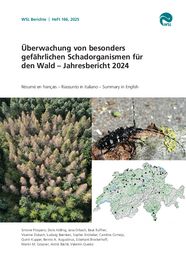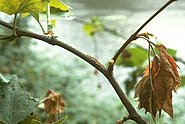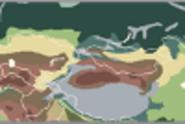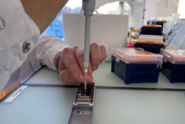
Invasive species ¶
Every year, new plant and animal species migrate to Switzerland, or are introduced in various ways from other continents. While some are harmless, others cause considerable damage. We help to foster an understanding of the biology of these problematic species, and to prevent or curb their spread.
Contents ¶
Alongside habitat destruction, invasive species such as the tree of heaven (Ailanthus altissima), the Asian longhorn beetle and the ash dieback pathogen are currently among the most serious threats to species diversity worldwide. We study invasive organisms and help the authorities to develop management strategies. Since the number of thermophilic invasive species spreading throughout southern Switzerland is particularly high, this is a focus of our research at our site in Cadenazzo (Ticino). At the "Cadenazzo Research Campus", we work with Agroscope, Agridea and the Swiss Federal Plant Protection Service (SPPS) in the area of invasive species south of the Alps.
Improved protection thanks to Plant Protection Laboratory ¶
The invasive species include many types of insects, fungi, nematodes, bacteria and viruses which trigger plant diseases in forests and ornamental trees and shrubs. We diagnose, study and monitor these in our research unit "Forest health and biotic interactions" and look for biological control measures.
The Plant Protection Laboratory opened in 2014 on the WSL site, allowing researchers to work with alien organisms. Here we can diagnose and examine suspected cases of quarantine diseases and pests under strict safety conditions.
Identifying pest infestations as early as possible ¶
"Swiss Forest Protection" runs a monitoring system in order to protect our forests from native and non-native forest pests and diseases. This consists of a dense network of observers. Swiss Forest Protection advises forest owners and rangers, helps to identify organisms, regularly conducts surveys with forestry services and organises training courses.




